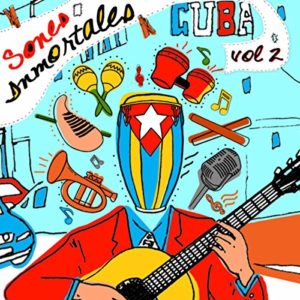 “CHENCHA LA GAMBÁ”. PERSONAJES Y OTRAS CURIOSIDADES.
“CHENCHA LA GAMBÁ”. PERSONAJES Y OTRAS CURIOSIDADES.
En el argot popular mexicano ‘Chencha’ es ser un vago, un holgazán; en otros países tiene otras connotaciones, como lo es el femenino de Chencho, pero en Cuba y Venezuela, a las mujeres de nombre ‘Inocencia’ (por el día de los Santos Inocentes, 28 de diciembre), les dicen “Chencha”y también cuando una persona cojea, o camina con dificultad, se usa una expresión: “camina como Chencha, con la pata gambá”.
En la década de 1940 estuvo en boga una guaracha cubana que aludía a una mujer que caminaba cojeando y meneándose mucho por las calles de La Habana. Dicha mujer se llamaba o le decían “Chencha” y la música de la canción fue muy pegajosa, por lo que a todo el que caminaba de aquella forma, se le decía que caminaba “como Chencha”.
Es una guaracha del mayor guarachero cubano.
“Yo nací con mi pata gambá
igualito igualito que chencha
y que tengo que yo ver con chencha
si nací con mi pata gambá.
Oye camina como chencha …
la gambá …
como chencha la gambá…
camina pa`lante y camina pa`tra….”
Celeste Mendoza “Camina como Chancha”
Ñico Saquito cuyo nombre era Benito Antonio Fernández Ortiz, fue compositor, guitarrista y cantante cubano fundamentalmente de guarachas que han trascendido como clásicas en la música popular cubana y de otros países.
Ñico (el diminutivo cubano para Antonio), abandonó una prometedora carrera en el béisbol, y su sobrenombre de Saquito le vino de su gran habilidad para atrapar bolas como pelotero.
Sus composiciones se destacan por ser guarachas con letras ingeniosas y picantes sobre la vida personal o eventos de la comunidad, siendo de las más famosas la guajira “Al vaivén de mi carreta”, una balada sentimental de la vida en el campo y de las miserias de la vida campesina, así como “Cuidadito, compay gallo”, “María Cristina me quiere gobernar” , esta última su obra más conocida y muchas otras hasta la cifra de 500.
Ñico Saquito “Maria Cristina me quiere gobernar”.
Celeste Mendoza y Daniel Santos grabaron “Chencha, la gambá” y “Mi cinturita”. Los Panchos incluyeron “Silverio, Facundo y la luna”. Miguelito Valdés cantaba “Atízame el bastidor”, “La negra Leonor” y “No te vistas que no vas”. Hizo otras muy populares en su momento como “Ya Don Rafael habló” y “Estoy hecho tierra”. Sus creaciones han permanecido a través de los tiempos en el repertorio invariable de grandes intérpretes como Benny Moré, Compay Segundo, el Septeto Ignacio Piñeiro, Cheo Feliciano, Oscar D’ León, por sólo citar algunos de ellos. Numerosas películas del cine latinoamericano cuentan con sus obras en sus bandas sonoras.
Ñico cuenta que obtenía la materia prima para sus historias de su experiencia personal y de las anécdotas de familiares y amigos, especialmente narradas durante los velatorios, que dice, eran su mayor fuente de inspiración por la cantidad de cosas que en ellos se narraban.
 “CHENCHA LA GAMBÁ”. CHARACTERS AND OTHER CURIOSITIES.
“CHENCHA LA GAMBÁ”. CHARACTERS AND OTHER CURIOSITIES.
In the Mexican popular slang ‘Chencha’ is to be a lazy, lazy person; in other countries it has other connotations, such as the feminine one of Chencho, but in Cuba and Venezuela, to the women of name ‘Innocence’ (for the day of the Holy Innocents, December 28), they say “Chencha” and also When a person limps, or walks with difficulty, an expression is used: “walk like Chencha, with the gambá leg”.
In the 1940s, a Cuban guaracha was in vogue that alluded to a woman who walked limping and wagging a lot through the streets of Havana. This woman was called or called “Chencha” and the music of the song was very sticky, so that everyone who walked that way, was told to walk “like Chencha”.
It is a guaracha of the greatest Cuban guarachero.
“I was born with my gambá leg
Same as chencha
and what do I have to do with chencha?
if I was born with my gambá leg.
Hey, walk like chencha …
the gambá …
like chencha la gambá …
walk pa`lante and walk pa`tra …. ”
Celeste Mendoza “Walk like Chencha”
Ñico Saquito whose name was Benito Antonio Fernández Ortiz, was a Cuban composer, guitarist and singer, fundamentally of guarachas that have transcended as classic in Cuban popular music and from other countries.
Ñico (the diminutive Cuban for Antonio), left a promising career in baseball, and his nickname of Saquito came from his great ability to catch balls as a baseball player.
His compositions stand out for being guarachas with witty and spicy lyrics about personal life or community events, being the most famous the guajira “Al vaivén de mi carreta”, a sentimental ballad of life in the countryside and misery of the peasant life, as well as “Cuidadito, compay gallo”, “María Cristina wants to govern me”, this last one is her best known work and many others up to the number of 500.
https://youtu.be/b97_g5SaMh4
Trio La Rosa “Maria Cristina me quiere Gobernar”.
Celeste Mendoza and Daniel Santos recorded “Chencha, la gambá” and “Mi cinturita”. The Panchos included “Silverio, Facundo and the moon”. Miguelito Valdés sang “Atízame el bastidor”, “La negra Leonor” and “No te visto que vas”. He made others very popular at the time such as “Ya Don Rafael spoke” and “I am made earth”. His creations have remained throughout the times in the unvarying repertoire of great performers like Benny Moré, Compay Segundo, Septeto Ignacio Piñeiro, Cheo Feliciano, Oscar D ‘León, to name just a few of them. Numerous films from Latin American cinema have their works in their soundtracks.
Ñico tells that he obtained the raw material for his stories of his personal experience and the anecdotes of family and friends, especially narrated during the wakes, which he says were his greatest source of inspiration for the amount of things that were narrated in them.
Agencies/ Memorias Cubanas/ Internet Photos/ YouTube/ Arnoldo Varona/ www.TheCubanHistory.com
THE CUBAN HISTORY, HOLLYWOOD.






